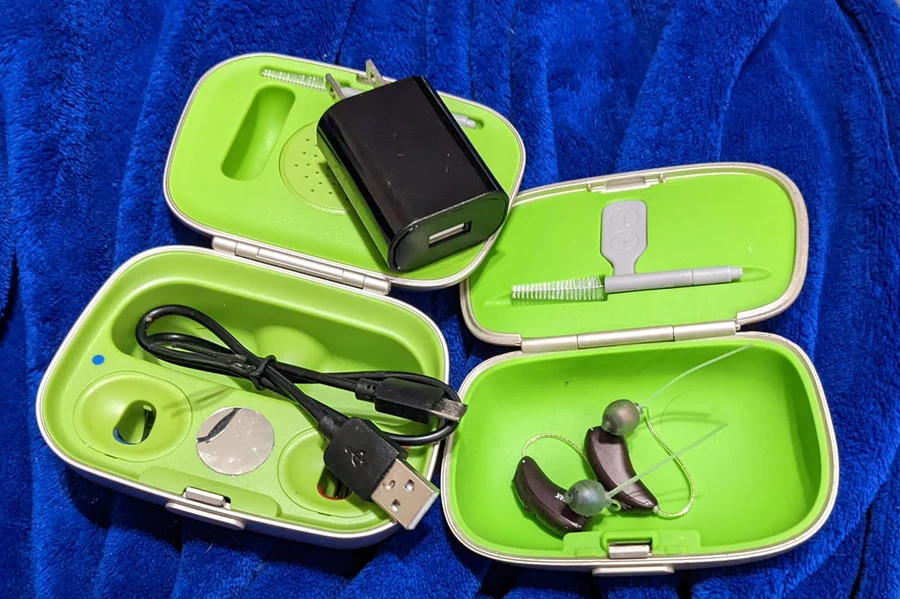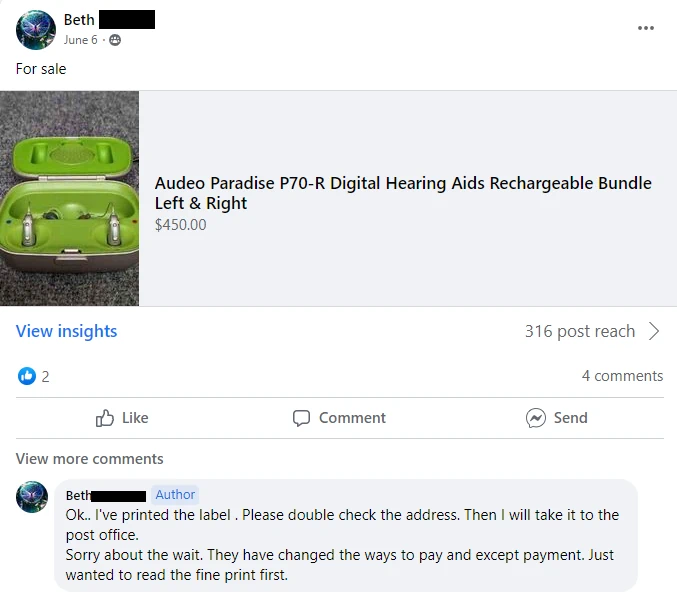Meta Description: Thinking about buying used hearing aids online? Learn the 7 major risks—including poor fit, lack of programming, and fraud—plus safer alternatives recommended by a professional audiologist.
As a professional audiologist, I’ve met many patients who are tempted to purchase used hearing aids online in an effort to save money. Websites like Facebook Marketplace, Craigslist, and hearing aid buy/sell groups often advertise significantly discounted devices. While the price may be appealing, there are critical risks and hidden costs that buyers need to understand before making this decision.
Risk 1: Incorrect Fit and Comfort
Hearing aids are often custom-fit to the original user’s ear canal and hearing needs.
- Used hearing aids may have the wrong wire length, dome size, or earmold shape, causing discomfort, soreness, or slippage during wear.
- Poor fit can lead to feedback (whistling) and reduced sound quality, making the device less effective.
- Refitting a device may require professional services, which adds to the total cost.
Risk 2: Lack of Proper Programming
Hearing aids must be programmed for each individual’s hearing loss profile. Unless you buy a self-fitting OTC hearing aid, you’ll need a professional to reprogram the device for your hearing test results.
- Online sellers usually cannot provide this customization.
- Improper programming may result in distorted, muffled, or overly loud sound.
- Reprogramming fees vary and may erase any initial savings.
Risk 3: Uncertain Condition and Lifespan
The condition and remaining life of a used hearing aid are often unknown.
- The device could have unseen water damage, corrosion, or microphone issues.
- Hearing aids generally last 5–7 years, and many used models are already several years old.
- Batteries and receivers may need replacement soon after purchase.
- Repairs can be costly, especially without a valid warranty.
Risk 4: Lack of Warranty and Aftercare Services

Most manufacturers void warranties when devices are transferred to a new user.
- No coverage for malfunctions, repairs, or loss and damage replacement.
- Aftercare services—like adjustments, cleanings, and software updates—may be denied for second-hand devices.
- You’ll likely pay out-of-pocket for any servicing needs.
Risk 5: Inadequate Sanitation
Used hearing aids may carry bacteria, fungi, or earwax from the previous user.
- Improperly sanitized devices can transmit ear infections.
- Full disinfection is challenging due to delicate electronics and tubing.
- Professional cleaning is recommended but adds extra cost.
Risk 6: Potential for Fraud
Buying from unverified sellers increases the chance of scams.
- Misrepresentation: The seller may list a counterfeit, outdated, or defective device as a premium model.
- Payment scams: Requesting payment via untraceable methods, then disappearing.
- Identity theft: Using your personal details for further fraud.
- Fake listings: Selling a product they don’t even have.
Always use secure payment platforms, verify seller reviews, and be wary of “too good to be true” pricing.
Risk 7: No Trial Period
New hearing aids include trial periods—used hearing aids rarely do.
- No opportunity to test comfort, performance, or sound quality before committing.
- No refunds or exchanges if the device doesn’t work for you.
Conclusion
While buying used hearing aids online may appear to save money upfront, the risks often outweigh the benefits. Lack of proper fit, programming, warranty, and hygiene can lead to frustration and unexpected expenses. As a certified audiologist, I strongly recommend exploring safe, affordable options such as professionally fit budget-friendly hearing aids or new OTC hearing aids to ensure both your hearing health and your investment are protected.
Used hearing aids may look like a bargain but often carry risks of poor fit, hygiene issues, and lack of warranty. For safer and more reliable alternatives, check out our Hearing Aids Buyer’s Guide.
Frequently Asked Questions
Can used hearing aids be reprogrammed? Yes, but you’ll need an audiologist, and not all clinics will work with devices purchased elsewhere.
Are there safe ways to buy used hearing aids? If you must buy used, go through a licensed hearing care provider who can verify condition, provide cleaning, and ensure proper programming.
How much can you save buying used? While prices may be 30–70% lower, added costs for repairs, reprogramming, and parts can erase savings quickly.

